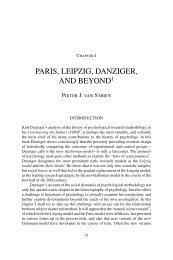The positivist repudiation of Wundt - Kurt Danziger
The positivist repudiation of Wundt - Kurt Danziger
The positivist repudiation of Wundt - Kurt Danziger
Create successful ePaper yourself
Turn your PDF publications into a flip-book with our unique Google optimized e-Paper software.
206 KURT DANZIGER<br />
remains untranslated. This is not really surprising. It is apparent that Boring took his ad-<br />
mired teacher, E. B. Titchener, as a guide in these matters, and Titchener practically<br />
made a ’career out <strong>of</strong> interpreting <strong>Wundt</strong> in his own highly idiosyncratic fashion.’<br />
Boring is more reliable on the alternative model for psychological science because<br />
here he is discussing his own intellectual roots. He identifies the proponents <strong>of</strong> the “new”<br />
psychology as a group whose most prominent members were Oswald Kiilpe, Hermann<br />
Ebbinghaus, and Titchener, and he indicates that what these men had in common was a<br />
commitment to the new philosophy <strong>of</strong> positivism associated with the names <strong>of</strong> Ernst<br />
Mach and Avenarius.2 But when we attempt to assess the significance <strong>of</strong> this new<br />
philosophical commitment for the historical development <strong>of</strong> psychology, Boring’s<br />
chapter is not <strong>of</strong> much help. First, Boring’s total lack <strong>of</strong> interest and understanding for<br />
<strong>Wundt</strong>’s philosophy <strong>of</strong> science (or any non<strong>positivist</strong> philosophy <strong>of</strong> science, for that<br />
matter) means that the fundamental issues which separated the two points <strong>of</strong> view are<br />
never allowed to emerge. <strong>The</strong> image is one <strong>of</strong> steady progress from philosophy to science<br />
in which <strong>Wundt</strong> has had his day because he is too philosophical and Mach provides the<br />
practical epistemology which good scientists can use. Second, Boring’s way <strong>of</strong> organizing<br />
historical material by personalities tends to obscure the topical foci around which in-<br />
dividual positions clustered. Neither the text nor the notes convey anything <strong>of</strong> the<br />
historical confrontation between the <strong>Wundt</strong>ian and the <strong>positivist</strong> alternative, a confron-<br />
tation which caused one contributor to the debate to call his paper, “<strong>The</strong> Crisis in<br />
Psychology.”<br />
Finally, and most critical <strong>of</strong> all, there is the fact that Boring was himself deeply<br />
committed to the <strong>positivist</strong> philosophy <strong>of</strong> science whose influence on the early develop-<br />
ment <strong>of</strong> psychology is at issue here. But his is the commitment <strong>of</strong> the second generation:<br />
What had been for his teachers conclusions carefully arrived at and boldly asserted, have<br />
now become matters to be taken for granted, implicit certainties not open to debate or<br />
even worthy <strong>of</strong> mention. For the historiography <strong>of</strong> psychology the major consequence <strong>of</strong><br />
this stance is that the dependence <strong>of</strong> psychological theory and method on prior<br />
philosophical commitments is lost from view. Because only one kind <strong>of</strong> philosophy <strong>of</strong><br />
science is regarded as legitimate (or even conceivable), differences on scientific issues are<br />
not seen as the consequence <strong>of</strong> philosophical differences. This is a comforting attitude for<br />
those who have no wish to question fundamental assumptions, and that usually includes<br />
the conservative majority. When a particular philosophical commitment becomes<br />
characteristic <strong>of</strong> the mainstream <strong>of</strong> development in a certain field, it is usually so much<br />
taken for granted that it is not even identified by its practitioners. Boring was aware <strong>of</strong><br />
this fact. At the end <strong>of</strong> his chapter on the tendencies represented by Mach, Avenarius,<br />
Kiilpe, Ebbinghaus, and Titchener, he reflects on the lack <strong>of</strong> a name for this group<br />
because it simply became identified with psychological orthodoxy: “It never felt the need<br />
<strong>of</strong> any other name than ‘psychology,’ which it carried away from philosophy, when the<br />
two separated. <strong>The</strong> enemies <strong>of</strong> this orthodox psychology name it, but always in accor-<br />
dance with what they most dislike in it.” At the risk <strong>of</strong> earning the label <strong>of</strong> an enemy, it<br />
is proposed that the trend in question be identified by its fundamental commitments,<br />
those <strong>of</strong> the philosophy <strong>of</strong> positivism.<br />
When it came to assigning a place among the sciences to psychology, <strong>Wundt</strong><br />
proceeded from the basic distinction between Naturwissenschaften and Geistes-<br />
wissenschaften which was so characteristic <strong>of</strong> German academic life. Thus he dis-<br />
tinguished two kinds <strong>of</strong> psychology, physiological and experimental psychology, on the





